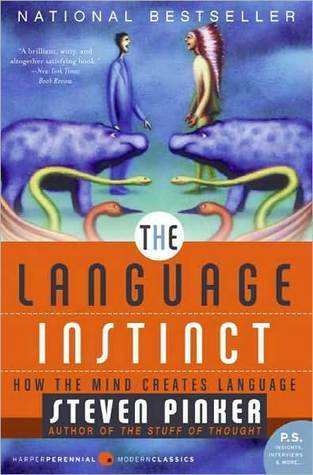More on this book
Community
Kindle Notes & Highlights
“makes infinite use of finite media.”
it turns out that the memory part is easy for computers and hard for people, and the decision-making part is easy for people (at least when the sentence has been well constructed) and hard for computers.
style manuals.
tyrannical
garden path sentences,
According to Chomsky, that is because a phrase referring to the boy really does occur after accused in deep structure; it has been moved backwards to the position of that by a transformation, leaving behind a silent “trace.” A person trying to understand the sentence must undo the effect of the transformation and mentally put a copy of the phrase back in the position of the trace. To do so, the understander must first notice, while at the beginning of the sentence, that there is a moved phrase, the boy, that needs a home. The understander must hold the phrase in short-term memory until he or
...more
The girl wondered who John believed that Mary claimed that the baby saw (trace).
semantic role
I wonder who (trace) introduced John to Marsha. [ who = the introducer] I wonder who Bruce introduced (trace) to Marsha. [who = the one being introduced] I wonder who Bruce introduced John to (trace). [who = the target of the introduction]
This dialogue took place on March 17, 1973, among President Richard Nixon (P), his counsel John W. Dean 3rd (D), and his chief of staff H. R. Haldeman (H). Howard Hunt, working for Nixon’s reelection campaign in June 1972, had directed a break-in at the Democratic Party headquarters in the Watergate building,
But one thing that surprised everyone was what ordinary conversation looks like when it is written down verbatim. Conversation out of context is virtually opaque.
We “gather” our ideas to “put” them “into” words, and if our verbiage is not “empty” or “hollow,” we might “convey” or “get” these ideas “across” “to” a listener, who can “unpack” our words to “extract” their “content.”
Languages are perpetuated by the children who learn them. When linguists see a language spoken only by adults, they know it is doomed.
“Any language is a supreme achievement of a uniquely human collective genius, as divine and endless a mystery as a living organism.”
“The loss of a language is part of the more general loss being suffered by the world, the loss of diversity in all things.”
Sentence length increases steadily, and because grammar is a discrete combinatorial system, the number of syntactic types increases exponentially, doubling every month, reaching the thousands before the third birthday.
The question is no longer “Why does a learning ability disappear?” but “When is the learning ability needed?” We have already noted that the answer might be “As early as possible,” to allow the benefits of language to be enjoyed
No biologist has explained why the left brain controls right space and vice versa.
But all the chordates have “contralateral” control: right brain controls left body and left brain controls right body. What could have led to the rewiring? Here is Kinsbourne’s idea. Imagine that you are a creature with the left-brain-left-body arrangement. Now turn your head around to look behind you, a full 180 degrees back, like an owl. (Stop at 180 degrees; don’t go around and around like the girl in The Exorcist.) Now imagine that your head is stuck in that position. Your nerve cables have been given a half-twist, so the left brain would control your right body and vice versa.
in fact, if human language is unique in the modern animal kingdom, as it appears to be, the implications for a Darwinian account of its evolution would be as follows: none. A language instinct unique to modern humans poses no more of a paradox than a trunk unique to modern elephants.
Try the following thought experiment. Imagine that anthropologists discover a relict population of Homo habilis in some remote highland. Habilis would now be our closest living relatives. Would that take the pressure off chimps, so it is not so important that they have something like language after all? Or do it the other way around. Imagine that some epidemic wiped out all the apes several thousand years ago. Would Darwin be in danger unless we showed that monkeys had language? If you are inclined to answer yes, just push the thought experiment one branch up: imagine that in the past some
...more
To be fair, there are genuine problems in reconstructing how the language faculty might have evolved by natural selection, though the psychologist Paul Bloom and I have argued that the problems are all resolvable.


